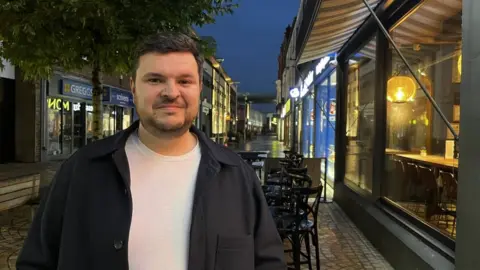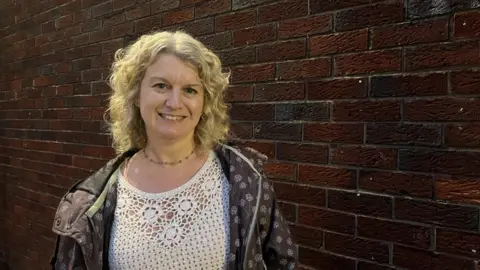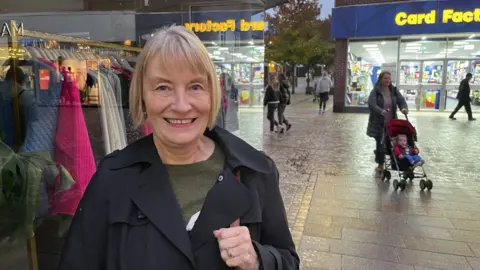Liz Truss: Tories must stop 'squabbling like schoolchildren,' voters say
 BBC
BBCThere may be 200 miles between Altrincham and Westminster, but everyone in this leafy Greater Manchester town I speak to has a view on the political turmoil that's enveloped the government.
"Oh God," says Nathan Mayall. I ask him what he makes of events as I stop him outside a restaurant in the town centre.
"There's been as many prime ministers in the last few years as I've had hot dinners, so it would be good to see some stability in the country, eventually," he ends with a nervous laugh.
Jane Corns, who I stop on the same street, is even more forthright.
"It's a complete shambles I'd say. Terrible," she says.
The seat of Altrincham and Sale West is where I've come to test the waters. It has been represented by Sir Graham Brady, chairman of the Conservative backbench 1922 committee, for the last 25 years.
It was Sir Graham who handed Liz Truss the metaphorical revolver and glass of whisky, and told her the game was up.
On the high street the majority of his constituents I spoke to felt the same way. "She couldn't go on," one person says.
While most people I spoke to felt Ms Truss had to go (just two people out of 15 told me they thought she ought to have been given more time), there was no agreement as to who should replace her.
Only two politicians were spontaneously mentioned when I asked who should come next: Rishi Sunak and Boris Johnson. But perhaps that's not all that surprising given their public profile compared to other politicians.
Some voters were prepared to overlook the Partygate debacle that played a part in bringing down the former prime minster.
"OK, he had a party in lockdown," Amanda Morley, an NHS nurse, tells me. "I bet loads of people did that.
"He got us through the coronavirus pandemic, he wasn't all bad. Who else is there?"

Yet Mr Johnson still has a marmite-like effect on the electorate, and another voter I spoke to described the idea of his making a comeback as "horrific".
"You don't bring somebody back in that's already been chucked out," they said. "If there's talk of that it just shows how far off the mark they are."
There was also a feeling from some that the whole Westminster system was out of touch, and that politicians were operating in their own world.
"They seem to live in a bubble of their own self-serving interests and they don't seem to understand how it affects ordinary people," nurse Amanda Morley told me.
"It's wrong. They should be dealing with the important matters at the time," said Jane Corns, "Not squabbling like schoolchildren."

Even when it came to what should happen next, views were polarised between those who wanted a general election and those who didn't.
In the space of a few minutes I'm told both the "farrago of a small selection of people choosing the prime minister has gone on too long" and "we have to leave it for the full five years".
Whatever happens, voter Joe Beardwood summed up the situation any new leader will face.
"It's easy to come up with a plan, the hard part is making everyone point in the same direction."
Politics at Westminster may be fractured and fraught, but 200 miles away in Altrincham, the same fault lines exist over what should happen next.